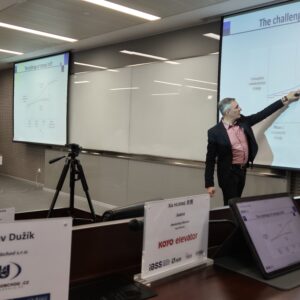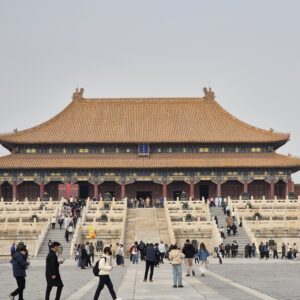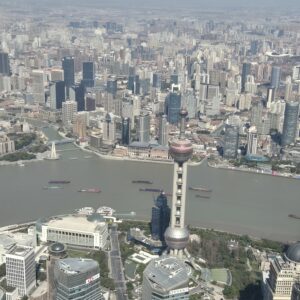From Czechia to China: My Experience with the EMBA Exchange Programme in Suzhou
Since the class of 2023, our curriculum has included a study abroad experience. One of our students, Vítězslav Dužík, embraced this opportunity to broaden his perspective by studying in a different part of the world. What was his exchange experience like in Suzhou, China?
Introduction
As part of the International Exchange Programme within the Executive MBA at the Prague University of Economics and Business (VŠE), Faculty of Business Administration. I had the opportunity to attend a short-term study stay at one of the most progressive Chinese universities – Xi’an Jiaotong-Liverpool University (XJTLU) in Suzhou. From the moment I saw the list of partner schools, I knew I wanted to go beyond the European cultural and business environment. China appealed to me for its economic dynamism, different mindset, and social context.
This was not just an academic trip. I saw it as a unique opportunity to explore a different culture, leadership approach, and simultaneously test myself in both personal and professional terms. I was convinced this experience would broaden my understanding of global business and challenge the way I see the world.
Why China?
My motivation was clear from the beginning. I wanted to move outside the European bubble and confront my knowledge with a different cultural and business context. I was curious about how Chinese universities approach executive education, how leadership, sustainability, and innovation are taught, and how the local business mindset actually works—not through articles, but directly in contact with professionals, academics, and students.
This journey was about acquiring knowledge, but also about understanding how different worlds—Western and Eastern—can connect and collaborate.
Adaptation and First Impressions
Before departure, I read several articles and tips from experienced travelers. I was cautious about the language barrier, different payment systems, technology, and administrative requirements. Surprisingly, everything went smoothly.
Early preparation—understanding local payment apps, installing key tools, and setting up access to Chinese digital services—proved essential. Within a few days, I felt confident navigating both the city and campus. One surprise was how rarely English was used in everyday life, which challenged me to be more resourceful and creative in communication.
Study and Academic Experience
I attended the module ‘Leading Sustainability, Innovation and Change,’ led by two experienced academics: Professor Pavel Částka from the Czech Republic (ex University of Canterbury) and Dr. David Dufour. Both brought a strong international background, not only in academia but also in applying principles of sustainability and change management in real-world contexts.
I was deeply impressed by the approach of both instructors — the lessons were systematically prepared, focused, and delivered with great dedication. The course was highly interactive and rather than following slides, we shared practical insights, worked on case studies, and engaged in open discussions about current business challenges. Professor Částka, in particular, offered deep insight into ESG topics, building on years of professional and academic work abroad. His structured yet pragmatic approach gave the course a high standard.
Networking and Peer Experience
One of the most valuable parts of the programme was the interaction with fellow students—many of whom held managerial or executive positions across industries like manufacturing, finance, and IT. Sharing perspectives during lectures and in informal settings was extremely enriching.
Lunches, dinners, and casual conversations allowed us to compare European and Chinese leadership styles, innovation mindsets, and management cultures.
Below, I would like to share some more detailed observations. Naturally, these insights are subjective impressions based on a brief stay and should not be considered general or representative.
- In terms of sustainability, my conversations revealed no significant differences compared to the European context. People approach sustainability in various ways—for some, it serves as a means of market differentiation; for others, it’s mainly a response to regulatory pressures; and for a minority, it reflects an authentic values-driven approach. Overall, attitudes towards sustainability in China appeared pragmatic, without substantial ideological overtones, similar to those found in Europe.
- In contrast, a strong orientation towards innovation was highly evident. The Chinese environment emphasizes rapidly adopting new technologies and effectively adapting solutions developed elsewhere. From several discussions, I gained the impression that while China may not necessarily lead in every technological development, its ability to adopt, enhance, and practically implement existing tools—especially in areas like AI—is remarkable. I had the opportunity to speak with a university professor who, besides his academic work, participates in developing a new AI application. This project uses Western LLM technology aiming to identify novel formulations for specific materials. This example clearly illustrates how proactively innovations are accepted and adapted into practice in China.
- The management style in traditional Chinese companies tends to be distinctly hierarchical and strongly performance-oriented, as confirmed through conversations with several students. They described how, in many local companies, the primary goal is task completion as dictated by management—often with less emphasis on employee well-being, recognition, or opportunities for self-development and dialogue. Although this approach can also be found in Europe, I perceived it as more frequent and systematic in China. However, this remains purely a personal observation drawn from a limited number of experiences and discussions.
- Additionally, I heard experiences from individuals transitioning from international companies to purely Chinese enterprises, who described encountering a corporate culture shock so intense that it led them to leave their positions shortly afterward. The management style and approach were too distant for them to adapt comfortably.
- Conversely, Chinese branches of international firms generally adhere to Western management standards, emphasizing dialogue, trust, and responsibility. These differences in approach are significant and worth considering for anyone contemplating collaboration or employment within the Chinese business environment.
This networking and experience-sharing was not just about contacts—it helped me better understand the international context in which we all operate.
Suzhou – A City Between Tradition and Modernization
I spent most of my time in Suzhou, where the XJTLU campus is located. The city itself offered a unique opportunity to experience China not only through education, but through its everyday rhythm, architecture, and development.
Suzhou felt like a city in transition—still preserving its historical canals, gardens, and architecture, while clearly heading toward modernization and economic expansion. While the old city areas retain their charm, they are increasingly overshadowed by high-rise residential and commercial developments.
The contrast between quiet alleyways and modern towers was striking. Suzhou is highly efficient, safe, and well-organized—making it an excellent place to live, study, and work. Yet at times, the pace of growth seems to push the city’s traditional identity into the background. Suzhou isn’t a cultural capital in the classic sense, but rather a model of how China is evolving rapidly and decisively.
Travel and Learning Beyond the Classroom
During my stay, I also had the chance to visit two of China’s key cities—Beijing and Shanghai.
In Beijing, I spent three days exploring iconic sites like the Great Wall, the Forbidden City, and the Temple of Heaven. The scale, history, and energy of the capital left a strong impression on me. It was a perfect opportunity to see ‘big China’ from a cultural point of view.
In Shanghai, besides touring the city, I visited the Appliance & Electronics World Expo 2025—one of the major trade fairs for home appliances. Since I work in this field, it gave me a unique perspective on innovation trends and how Chinese brands approach global markets. It was a professional highlight of the trip.
Being able to combine study with cultural and business exposure in other cities was one of the key advantages of the exchange programme. The overall experience extended far beyond the classroom and provided a more complete understanding of modern China.
Final Reflections
My stay in China was a highly valuable experience that enriched both my professional knowledge and personal outlook. Each day brought new insights—whether in the classroom, in conversation, or just navigating life in a very different environment.
It was a break from routine that allowed me to grow in an international setting. The lessons I took away have influenced my thinking and approach to business.
To all EMBA students at VŠE: if you have the opportunity, take it. China may seem like a challenging destination—due to language, cultural differences, or unfamiliar technology—but it’s more than manageable and well worth the effort. The rewards are both tangible and long-lasting.
The International Exchange Programme is a standout feature of the EMBA at FBA/VSE. I would encourage anyone to take full advantage of this opportunity.





